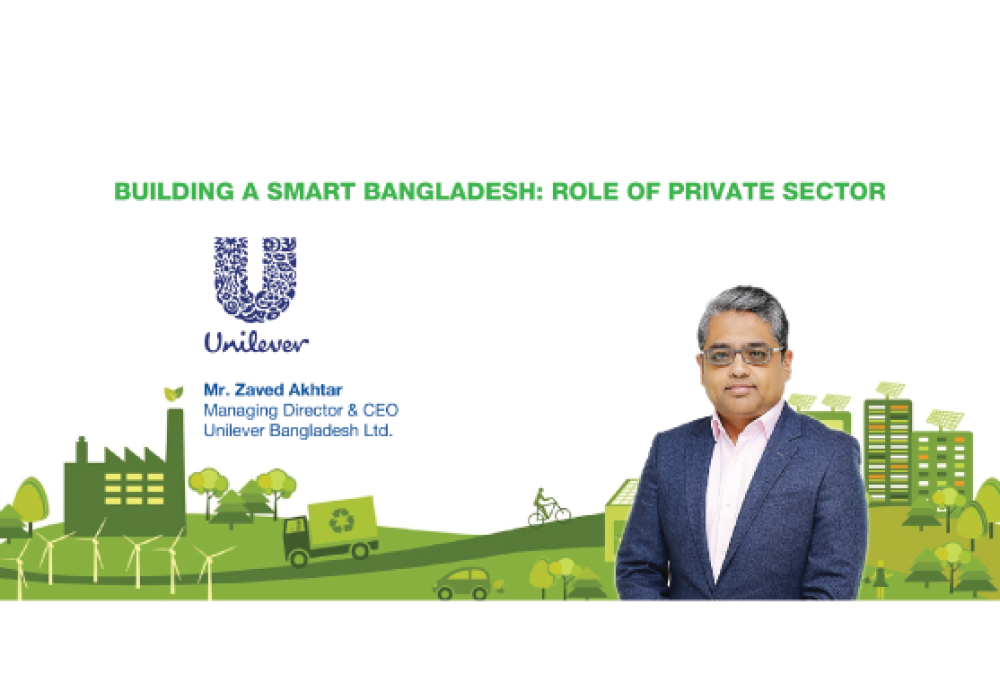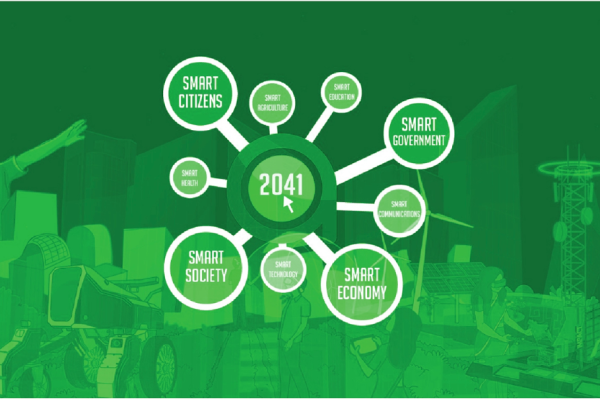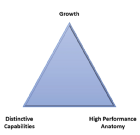- info@ficci.org.bd
- |
- +880248814801, +880248814802
- Contact Us
- |
- Become a Member
- |
- |
- |
- |
- |

• Context: Smart Bangladesh and Private Sector
Much has been written on Smart Bangladesh and the role of the Private Sector. When I was asked to write about it, I was really at wits end what to talk about that does not come out either clichéd or seems too erudite. My attempt of this deliberation will be to provide some practical perspective as to how we could unleash the private sector taking on learning from many other nations that have embarked on the same journey.

To kick of my reflection, I must say that Bangladesh's journey over the last few decades has been nothing but short of a miracle, especially the last 3 decades. During this period, we have been able to treble the delta GDP every decade. The economy has immense potential with an enormous pool of young talent and working age population (currently 69%), and a thriving middle class (34min) people who are expected to be in the middle and affluent class by 2025. Mobile phone penetration is almost universal and more than 80% of the population is covered by either banking or mobile financial services. With household consumption making up almost 70% of GDP, Bangladesh is set to be the 9th largest consumer market by 2030. While we have the right ingredients for building a Smart Bangla- desh, we also need the right recipe for all the 4 pillars, i.e., 'Smart Citizen', 'Smart Government', 'Smart Society' and 'Smart Economy' to dance in tango.
• Bangladesh: An Antifragile Economy
 Bangladesh’s biggest strength has been its resilient economy, which time after time has proven to withstand tectonic shifts, be it the pandemic-induced losses, economic fallout of wars, or be the impact of geopolitical instability or the volatile energy market shocks. It has in the past and even now shown the power to rebound from shocks and pushbacks and get back on the growth trajectory. It has an uncanny similarity to Nassim Taleb's book, Antifragile: Things That Gain from Disorder. Nassim advocates that some systems are strengthened by encounters with disorder and defines anti fragility as a nonlinear response. The pivotal question is what helps us as a country to build this trait. While there are many perspectives that one can attribute this to and despite it being seen as litigious, I would like to take the liberty and say that what has seen us through is the entrepreneurial spirit, zeal and ingenuity of our private sector partners who have weathered through the storm come what may and has helped businesses operating in Bangladesh continue to innovate by learning and keep growing even amidst headwinds.
Bangladesh’s biggest strength has been its resilient economy, which time after time has proven to withstand tectonic shifts, be it the pandemic-induced losses, economic fallout of wars, or be the impact of geopolitical instability or the volatile energy market shocks. It has in the past and even now shown the power to rebound from shocks and pushbacks and get back on the growth trajectory. It has an uncanny similarity to Nassim Taleb's book, Antifragile: Things That Gain from Disorder. Nassim advocates that some systems are strengthened by encounters with disorder and defines anti fragility as a nonlinear response. The pivotal question is what helps us as a country to build this trait. While there are many perspectives that one can attribute this to and despite it being seen as litigious, I would like to take the liberty and say that what has seen us through is the entrepreneurial spirit, zeal and ingenuity of our private sector partners who have weathered through the storm come what may and has helped businesses operating in Bangladesh continue to innovate by learning and keep growing even amidst headwinds.
• Role of Private Sector in Building a Smart Bangladesh
Therecent Boston Consulting Group (BCG) report Trillion-Dollar Prize Local Champions Leading the Way, calls private sector firms as emerging championand states "the private sector isalso boosting innovationand productivi- yt and leveraging the growing digital landscape with well-structured strategic programmes." Over the last few decades, we have also seen how private sector has taken advantage of its entrepreneurial spirits. Ready-Made Garments has taken the lead role in economic transformation and over the last decade, we have seen innovation in mobile financial services as telecommunication and internet also become ubiquitous. As we move to our domestic market, we have seenhow the private sector has helped in growing FMCG, white goods andservices sectorsand helped them thrive.

• Current Dilemma: Private Sectors Role in Smart Bangladesh
As a percentage of GDP, the private sector component had increased from 16.8% from 2001-02 to 21.8 % in 2015-16 and currently is hovering around 30%. Despite the growth it is far below the need, as we need to move this number north of 40%. Now the question is what is debilitating us from doing this? Well, if you ask me, I personally believe, much to chagrin to many of my friends in the bureaucracy, political power or in the private sector, the root cause is intent. The reason for this is because profit making is seen as a sin within the power brokers while at the same time, private sector has failed to build their brand by not being transparent enough or was unable to demon- strate how businesses can be a force for good for the country. Henceforth supporting private sector and fostering growth has a lot of time been delegated to mere lip service. We need to elevate ourselves to a new podium where we look towards private investment as a critical enabler for Smart Bangladesh, where regulators, bureaucrats, entrepreneurs, and businesspeople are working together rather than being the power brokers impeding the growth of the country. We need to focus more as to how we can accentuate investment, private or public. Public invest- ment on the infrastructure front — particularly on megaprojects — has increased, but at the same it has been unable to attract significantly higher private investment from either local or overseas sources. There is so much to do here for each of us and all of us.
• The Mantra for Unfurling Smart Bangladesh
 Now we are coming to the core point of my write up. I believe that to build a Smart Bangladesh transformational agenda we need to completely reinvent our value chain. This will mean across all the pillars of our economy; we will need to redefine how we unlock the opportunities. I will use a framework to define what I mean by this and then will contextualize in 3 dimensions, namely, groMh, distinctive capabilities, and high-performance anatomy. Let me break this down. Growth: Fundamental lever for us will always have to be growth. We have shown significant agility despite all the headwinds to deliver groMh and we need to continue this journey. The mantra for this has largely been based on public investments in infrastructure while private investments in leveraging the growth opportunity based on internal consumption or external opportunities. We will now need continue this as we deaverage the market opportunity and look at different segments and see what the ones are the people looking for.
Now we are coming to the core point of my write up. I believe that to build a Smart Bangladesh transformational agenda we need to completely reinvent our value chain. This will mean across all the pillars of our economy; we will need to redefine how we unlock the opportunities. I will use a framework to define what I mean by this and then will contextualize in 3 dimensions, namely, groMh, distinctive capabilities, and high-performance anatomy. Let me break this down. Growth: Fundamental lever for us will always have to be growth. We have shown significant agility despite all the headwinds to deliver groMh and we need to continue this journey. The mantra for this has largely been based on public investments in infrastructure while private investments in leveraging the growth opportunity based on internal consumption or external opportunities. We will now need continue this as we deaverage the market opportunity and look at different segments and see what the ones are the people looking for.

b) Oistincfive Capabilities: Thus far Bangladesh as a country has used cost as an arbitrage be in being the seamstress to the world or be it being the reincarnation of the new age chattel slavery by supplying low-cost labor to the world. But what brought us here will not take us where we want to go so the next arbitrage that we need to build should not be cost but rather should be cerebral. We will need to move from being the lowest cost solution for the world to becoming the smartest resources. This will mean that we build strong resources who are best in class in coding, data & advanced analytics, and artificial intelligence. Because distractive capabilities will mean that these are capabilities that others cannot easily replicate. Cost can be copied easily but cerebral will take time and would be difficult if we keep on moving ahead.
c) High Performance Anatomy: This leads to the next point and that is about building the next generation business. It will mean that we need to inculcate high performance ethos into our everyday operation. With an increasingly de-globalized world where we will need to survive on country-to-country trade agreements, this will mean that we will not be receiving any concessions and we will need to fend for ourselves in a global market and operate in the highest level of intellectual and mental dexterity.
• Unlocking the Opportunity for Smart Bangladesh
a. Predictability of' Policies: As we gear up to become a leading economy of the world, we need to bring more predictability of our policies. We have harrowing experience of policies being made to entice trade and investment and yet again that policy is being turned turtle after a few years making the investment unviable. This does unsur- mountable damage to our brand Bangladesh.
b. Separation o/' Policy Making and /nterna/ Rev'enue Co/Section: Today the revenue collection and policy making are done by the same body. Judge, jury, and executioner are all in the same, much to the bereft of the industry and private investors. We need to separate policy making for internal revenue collection and execution. Casing point is to add supplementary duties to already duty paid products making them cost almost equivalent to imports.
c. Regulators and Private Sectors: Regulators need to master working with their stakeholders to build and drive regulations that fosters growth. Equally private sector needs to elevate themselves to play a stronger role of collabo- rating with regulators and do something for the nation. Unfortunately, in most cases, it is the other way around where regulators believe that their role is to restrain from experimentation or private sectors looking at regulations for augmenting personal benefit. I believe as regulators need to look at compliances and at the same time build policies and regulations, private sector should also play a pivotal role to drive self-compliance and foster collabora- tion with their stakeholders to partner for growth.

d. Collaborate and Co Create Legislative Solutions: Tomorrow’s world needs more space for collaboration. Gone are the days of creating legislation within the solitary confinement of the legislative bodies and now it needs wider participation where we take into input from a cross section of the industry.
e. Strong Financial Sector: No economy can thrive without a robust financial sector. Today we have far too many than needed for an economy like Bangladesh. Just for comparison Bangladesh has 61 scheduled banks and the same number for India is 34. Such fragmentation has led to substantial challenges to the banking sectors with things like inadequate liquidity or non-performing loans. Time is prime for us to consolidate. Digital Banking can be a strong enabler for us in this space.
f. Protecting /nte//ect¢/a/ Property Rights: One of the important prerequisites for any successful private invest- ment is to protect their franchise. Bangladesh has strong laws around intellectual property rights and trademark protection. However, despite the law the execution of the law has been poor thus far. It is important that we take this with war footing and ensure that we are protecting the most valuable assets of the organization, i.e., their brand and product identity.
g. Simplifying the Arbitration Law: We have a dated arbitration law and its now high time that we are refreshing it and making it conducive to the parties. Having an arbitration judgement yet still require going the district court takes away the main reason of arbitration.
h. Digitization, Digitalization and Digital Transformation: We now need to accelerate and digitize where we need to and digitalize where it needs to be. But beyond that we need to look at how we can completely transform the way we work in the future with the full help of digital technology. We need to ensure that end to end the whole value chain, be in seeking regulatory approval, ensuring excise payment, or seeking arbitration, everything can be transformed leveraging digital tool.
i.Advanced Data and Analytics: Today the world is sitting on data. The challenge is how we are leveraging the mass availability of data. It is important that we bring these to surface to assess whether we are leveraging these properly.
j. Removal of High Tariff and Non-Tariff barriers: Bangladesh is still an extremely high tariff country with multitude of direct and indirect tariffs. As we become middle income country, we will need to rationalize many of these to ensure market access while at the same time protect our internal revenue collection and promote local industries. It will require a fine balance of moderating tariffs while fostering domestic growth so that we are able to continue the trajectory of accelerated revenue collection. The government can significantly leverage this opportuni- ty by simplifying the duty structure for raw materials so that local industries can foster well and cater to the domes- tic market. Some of the recent reforms over the last few years in this space and its outcome are a clear example.
• Conclusion

The Author of this article Mr. Zaved Akhtar joined Unilever in 2000 after 3.5 years in British American Tobacco. He has worked in multiple business units across Bangladesh, India, Philippines, and Southeast Asia and demonstrated the ability to thrive across distinct cultures. He has rich international experience in brands, innovation, communica- tion development and iousiness management. In his immediate past role as Vice President, Digital Transformation & Growth, Zaved led a comprehensive end-to-end digital transformation program with impact. He has also institution- alized Market Development and drove Net Revenue Management in Unilever’s business in South Asia. Zaved is a graduate from the institute of Business Administration (IBA), University of Dhaka. He is also a Director of Foreign Investors’ Chamber of Commerce and Industries.





